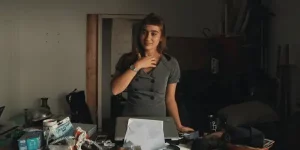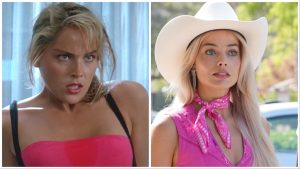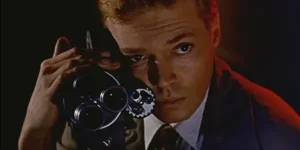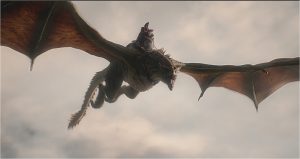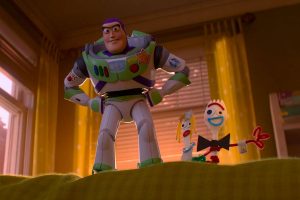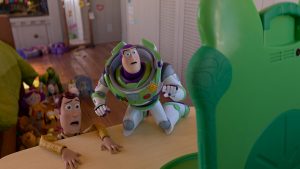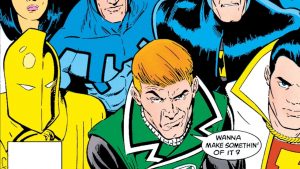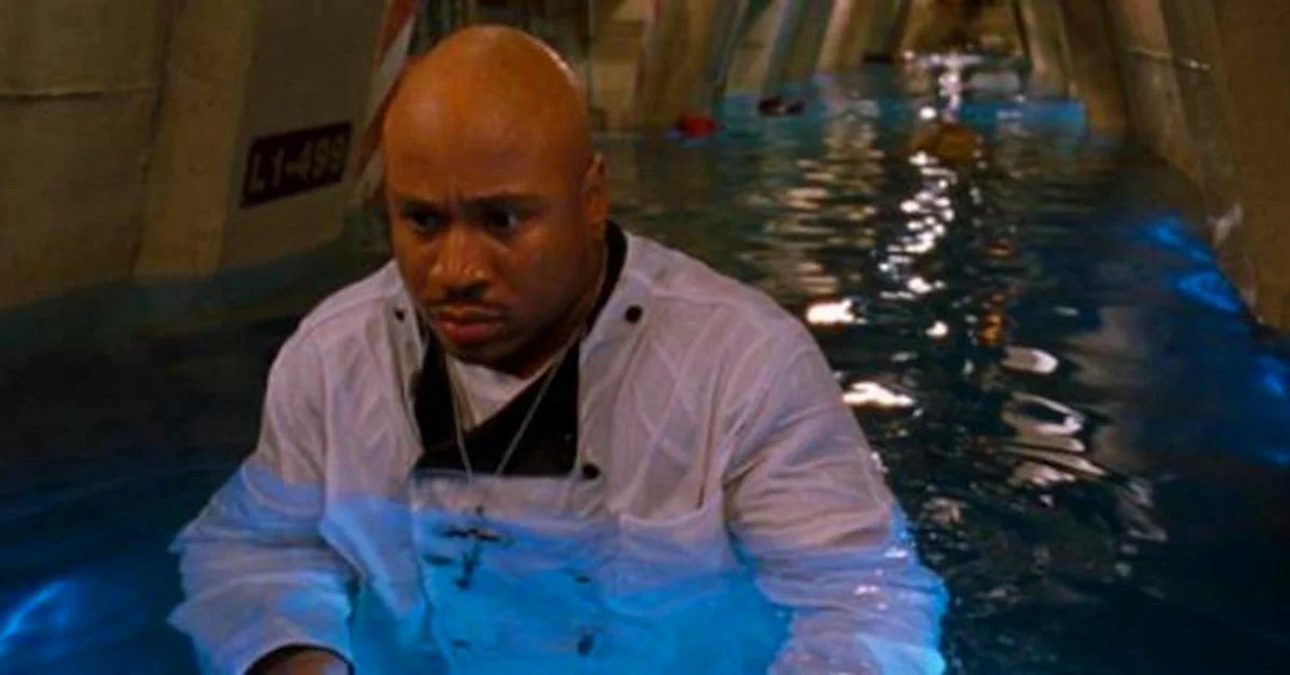
The 25th anniversary of Deep Blue Sea is generally not seen as a significant cultural event. In the grand context of a world spinning wildly off its axis, finding time to remember that movie where scientists use shark brains to cure Alzheimer’s can be difficult.
Yet Deep Blue Sea deserves to be remembered. Not for the events of the film itself—though it is, remarkably, still one of the best shark movies ever made—but rather for the incredible original rap song that plays over its end credits, “Deepest Bluest (Shark’s Fin).” In that rousing ballad, rapper and Deep Blue Sea co-star LL Cool J delivers what could best be described as a shark’s diss track to the rest of the world sung from the shark’s perspective. Best remembered for the lyric, “Deepest, bluest, my hat is like a shark’s fin,” it occasionally makes the rounds online as a piece of absurdity second only to one scientist’s belief that incredibly smart sharks may be the key to curing Alzheimer’s.
It’s more than that though. “Deepest Bluest” was a turning point for an era in which major movie studios argued that the best way to end a movie was with a rap song about that movie. These “Rap-Up” songs became fodder for parody even in their day and are sometimes seen as the culmination of several questionable trends. Yet at a time when movie studios are scrambling to turn new releases into major events, perhaps there is more to learn from these Rap-Up songs than what happened in the movie last you watched in theaters.
The Origins of The Rap-Up Song
For decades, many Hollywood studios that also owned record labels have attempted to release hit singles alongside their biggest new movies. The idea was that the success of one could help promote the other. That is essentially how we ended up with the Elvis-led films of the ‘50s and ‘60s. Could Elvis act? Not in the traditional sense, but he could certainly sing in the numerous musical numbers those films packed into their 90-minute “plots.”
Over time, the relationship between the movie tie-in single (or even entire movie soundtracks) evolved. In some cases, it became more symbiotic. It’s difficult to separate the Bee Gees from Saturday Night Fever or “Eye of the Tiger” from Rocky III. In other cases, the tie-in single song became bigger than the movie it was featured in. “Gangsta’s Paradise” outlived the cultural relevance of Dangerous Minds, and who even remembers that the chart-topping “(Everything I Do) I Do It for You” was part of the Robin Hood: Prince of Thieves soundtrack?
The Rap-Up song is different. The very concept of Rap-Up songs makes them impossible to separate from the movies they are featured in. That is because their lyrics and music videos are about the movies they are featured in.
In that sense, they are often closer to sitcom intro songs that quickly establish the narrative of the show itself (such as The Beverly Hillbillies theme song). Aside from their music genre, the element that unites them is the metaphysical way they seem to exist between the world of the film and our world. Their truly incredible music videos even feature rappers being transported into the worlds of the movies or otherwise acting as if those movie worlds are the real world. It’s as if those performers have shattered all known planes of existence, seen into dimensions beyond our corporeal comprehension, and are only able to convey their transcendental travels via rap.
While other music genres have been used to serve similar purposes, rap has gifted us with some of the most wonderfully bizarre promo songs ever crafted. The utterly bizarre nature of those songs recalls the famous Key and Peele sketch in which Star Magic Jackson Jr. greenlights every “first thought” idea for Gremlins 2.
A song about The Fat Boys inheriting a house from “Uncle Frederick” featuring verses from Freddy Krueger himself? It’s in Nightmare on Elm Street 4: The Dream Master. Tom Hanks and Dan Aykroyd rapping about shutting down pagan rituals (complete with full satanic panic costumes)? It’s in Dragnet. Vanilla Ice quickly concocting a fully-choreographed rap about the Ninja Turtles after they crash his concert? It’s in Teenage Mutant Ninja Turtles II: The Secret of the Ooze. MC Hammer recounting the time he had to borrow some pepper from the Addams Family? It’s not only in The Addams Family, it’s inseparable from The Addams Family.
While popular throughout the ’90s, the Rap-Up song trend is certainly a product of ‘80s culture. That’s the era that gave us the rapping granny, Rodney Dangerfield’s rap single, Barney Rubble rapping about Fruity Pebbles, and the whitest kid you know rapping about The Legend of Zelda. The popular idea was that anything that could be turned into a rap song should be turned into a rap song.
At this point, you may be wondering if these songs were a celebration of rap’s rise into pop culture prominence or merely a cynical attempt to exploit the genre. The answer is “Yes.” There was an underlying parody element to many of these songs that suggested a misunderstanding of the new musical medium or a desire to keep it sanitized enough to be exploited. At a time when N.W.A and Public Enemy were revolutionizing rap and scaring the hell out of the suburbs in the process, studios and corporations were using neutered versions of that music style to sell the residents of those neighborhoods cereal, detergent, and movie soundtracks.
Yet there is an innocence to Rap-Up songs that may be related to ignorance but which nonetheless transformed into a kind of genre unto themselves. Like the industrial musicals of old, they would often give legitimate artists the chance at a massive paycheck for relatively simple work. If you really want to be generous, you could argue that they also helped pave the way for more meaningful rap songs to make an impact in bigger movies. Do the Right Thing’s use of Public Enemy’s “Fight the Power” is one of the most notable early examples of that level of success. Interestingly, Do the Right Thing originally had a titular Rap-Up style song that Spike Lee chose not to use but which was later re-purposed for Wes Craven’s People Under the Stairs soundtrack.
The divide between the Rap-Up song and the Rap single was always clear, though, with the reach of the former songs always being understandably limited. They would help sell some albums and would even sometimes chart, but how high could you expect raps about Fredy Krueger to climb? For the Rap-Up song to leave a truly impactful mark, it would take some kind of generational young movie star with a rare set of skills to change the conversation about those tracks in a big way.
Big Willie Style
It is remarkably easy to forget that Will Smith began his career as a teenage rapper who (alongside DJ Jazzy Jeff) produced a series of hits that made him a star by the time he was 20. Smith’s star had risen so high and so quickly, in fact, that NBC built a new TV sitcom around him despite there yet being any evidence he could… you know… act. Hey, it worked for Elvis.
Luckily, Will Smith could act. Really well. Perhaps The Fresh Prince of Bel-Air was a mere vehicle for Smith’s rising stardom, but he drove the show to cultural and creative heights nobody could have reasonably expected from the series. From there, Smith continued to defy expectations. 1993’s Six Degrees of Separation showed he could hold his own alongside all-time great actors in a dramatic role. 1995’s Bad Boys showcased his otherworldly movie star charisma. 1996’s Independence Day erased any doubts about his ability to draw as well, or better than, any other name in Hollywood.
But 1997’s Men in Black was a new challenge and opportunity for Smith. It was a blockbuster project designed to test the extent of his star power. So much so that Smith was asked to not only lead the bizarre sci-fi comedy but co-write and perform a Rap-Up song for the picture known simply as “Men In Black.”
It wasn’t the first Rap-Up song of Smith’s career. That honor goes to “A Nightmare on My Street,” the other Nightmare on Elm Street 4 song that the producers decided not to use for the film. However, this was the first time that a star of that caliber in a movie that big was asked to perform the Rap-Up song for a blockbuster he was starring in. It was a task that seemed to fall somewhere between a gimmick and a death sentence.
But Smith defied expectations again. “Men in Black” not only topped the charts; it won a Grammy award too. Rap-Up songs had found success outside of the theater screening rooms before, but nobody could have expected something like this. The biggest movie star in the world just released the biggest single in the world, and the song is about the number one movie he’s starring in. Somewhere, an executive bought a yacht and christened it “Synergy.”
There was renewed hope that we had only scratched the surface of the Rap-Up song’s potential. Like Smith himself, though, “Men in Black” overachieved. As the rest of the industry would soon discover, there is only one Will Smith.
Deep Blue Sea and The Decline
While Will Smith told the god of death “Not today” when he was tasked with writing a potential music career-killing rap for Men in Black, LL Cool J couldn’t quite subvert the sickle.
And I say that with deep respect to LL, who had the music credentials and is one of the best parts about 1999’s Deep Blue Sea. But when you decide to make a Rap-Up song from the perspective of a gangster shark and pen the line “Gotti of the deep,” you put yourself on a losing path. Mind you, “Deepest Bluest” is by far the best rap song about a shark ever written. I’ll go so far as to say that it’s the best rap song about a shark that will ever be written.
The thing you have to remember, though, is that “Deepest Bluest” is not an anomaly. It was yet another corny Rap-Up song with absurd lyrics and a truly unhinged music video like just about every other Rap-Up song that came before it. The problem wasn’t the song which while bad was enjoyable by any reasonable Rap-Up standards. The problem was “Men in Black.”
“Men in Black” had set a new standard for Rap-Up songs that soon proved to be unreasonable. Granted, “Men in Black” is a much better song (or at least has a better hook), but it was also attached to a much bigger and better movie and was sung by the biggest star in the world at that time. The factors that contributed to its ascension were almost impossible to replicate.
Deep Blue Sea‘s producers tried a bit too hard to replicate it as well. They gave a known rapper a leading role and asked him to deliver a literal rap song about the summer blockbuster he was in. It veered too close to “Men in Black’s” orbit and was never allowed to be what it was meant to be: a bit of enjoyable ridiculousness atop a ridiculously enjoyable movie. Instead it became a martyr for the entire Rap-Up song concept—buried so deep into the digital ocean that you can’t even find it on LL Cool J’s YouTube channel or any official Spotify sources.
It wasn’t just LL Cool J either. While Smith’s follow-up to “Men in Black” (“Wild Wild West”) was a hit on its own terms, it was a hit associated with a historic flop of a movie. It was the best part of that flop (well, that and those incredible Burger King tie-in sunglasses), but it too was tasked with replicating a unique sensation and failed to do so in quite the same way. Smith soon dropped the Rap-Up part of his star power package, and many movie studios stopped trying to look for Rap-Up artists altogether now that the ceiling had clearly been reached.
Smith didn’t kill the Rap-Up song, however, nor did LL Cool J. No, you’d have to pin that murder on time itself and shifts in the industry, which led to movie studios no longer having as much stake in music studios or otherwise no longer promoting their movies and artists in the same fashion. It’s an industry shift that also led to the relative decline of the tie-in single song: a once unflappable institution relegated to just a handful of films these days.
As for the Rap-Up, it lingers in our hearts and the outskirts of the industry. Eminem’s “Lose Yourself” from 8 Mile could be considered the crowning artistic achievement of the concept, but even it didn’t lead to a widespread revival. If you hear a Rap-Up song today, it’s usually as a parody or tribute to the golden age of the concept as seen in movies like Psycho Goreman. It still exists, but there’s a sense of shame associated with it that suggests it has to be chased with irony.
But to tell you the truth, I miss Rap-Up songs. Not exactly as they were, perhaps, but rather the ways they embodied a time when movies were bigger than being just content; they could trigger seismic cultural shifts that impacted multiple mediums. They celebrated the fun of the moviegoing experience in ways that sometimes feel hard to come by these days. If we reverse engineer the problem, maybe any longing for Rap-Up songs is more about the longing for the films they were often attached to. In the self-serious age of dramatic reboots and franchises being treated like precious objects, the idea of treating a movie as a piece of entertainment so pure that it comes with its own rap song feels positively magical.
But, to tell you the even greater truth, I miss Rap-Up songs exactly as they were. Give me a Dungeons and Dragons rap from Childish Gambino or a Mortal Kombat rap from Raheem Jarbo. Please do not let the fun such songs represent die at the hands of studio executives whose hats are distinctly unlike a shark’s fin.
The post Deep Blue Sea and the Lost Art of Wonderfully Bad Rap-Up Songs During the End Credits appeared first on Den of Geek.

